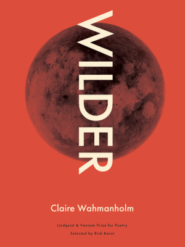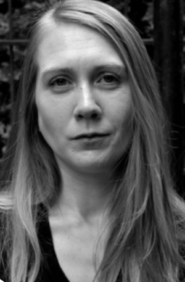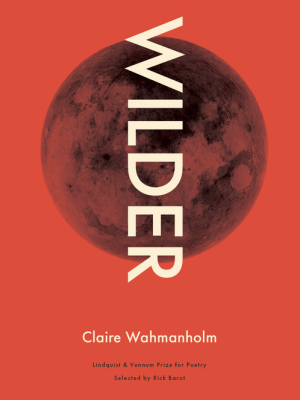Writers Read: Wilder by Claire Wahmanholm
 Claire Wahmanholm’s debut poetry collection Wilder at times feels like a bedtime story, full of ghostlike beings, ash-blanketed landscapes, corpse-flowers, and Cassandran prophecies echoing through it all. That might sound enchanting and more than a little spooky, but quickly things feel uncomfortably familiar. Isn’t this our world? Are those our voices? Or worse, those of the children we claim to love? In other words, Wilder is the kind of story that will keep you up at night, with the creeping notion that it isn’t just a story.
Claire Wahmanholm’s debut poetry collection Wilder at times feels like a bedtime story, full of ghostlike beings, ash-blanketed landscapes, corpse-flowers, and Cassandran prophecies echoing through it all. That might sound enchanting and more than a little spooky, but quickly things feel uncomfortably familiar. Isn’t this our world? Are those our voices? Or worse, those of the children we claim to love? In other words, Wilder is the kind of story that will keep you up at night, with the creeping notion that it isn’t just a story.
Wilder takes its title from the archaic root word of bewilderment (pronounced as it sounds at the end of “bewilder”) and Walhmanholm opens the book with the word’s definition: “1. To cause to lose one’s way, as in a wild or unknown place; to lead or
drive astray; 2. To render, or become, wild or uncivilized.”
Despite the title, the reader is set up to be quite oriented. The stage is set by introducing us to the speakers, who are described first in an epigraph by Auden: “children afraid of the night” who’ve become “lost in a haunted wood.” Wahmanholm continues: “whose eyes have never really opened” and “whose sockets grow tall bitter stalks/ that sprout small bitter buds/ that crawl with aphids.” (1).
These “children” retell the saga of the world’s end. In “Advent” some lines appear on page seven that already feel uncomfortably close to home:
“When our ears began to ache from the pressure,
we sent out our augurs.
A great fire, they said,
is blowing from the east.”
I read those lines in the abnormal light of Sun choking through wildfire smoke: a curtain thrown across California by the most destructive fire in the state’s history (this due primarily to uncharacteristically severe temperatures and drought.) The fact is, whether literally or metaphorically, every reader of this book will do so in the light of the fires of climate change. “Advent” turns its attention away from the “we” and toward other beings affected, such as plants and animals:
“We were out of songs to hum. Our throats were boxes
Of soot. In our orchards, no more insect thrum,
no swallow quaver.” (8)
The children here sound a bit like the voices the artist Anohni inhabits in her song “4 Degrees,” where she begs through an eerily bombastic stadium-ready anthem, to burn the earth and see its animals die. Only, the children’s reflections in Wilder take place long after those consequences have struck. They regret. They are stunned by their own selfishness. And they confess to a common theme in the book—Denial:
“How did we dare have children we couldn’t save?
If we closed our eyes, the falling apples
sounded like heavy rain.” (8)
The forms Wahmanholm employs throughout the book are expressive and differ greatly from each other. In one of several prose poems titled “Relaxation Tape” the children recount their attempts to ward off the disaster they helped to wreak upon their world.
“We listened to relaxation tapes to help us sleep. The purple sky was too bright…”
“We would not panic. Clench your fists, said the voice. I clenched my fists. Focus on where it hurts. I did. Then I relaxed and let the tension float away like smoke on the wind.” (61)
On one hand, the story recounts life on the planet as it decays, but interspersed throughout the book are unnamed poems which look like drifting murmurs: words strewn widely across pages of mostly blank space in near disarray after pyrrhic return from the grave or disaster. These poems vaguely recall M. NourbeSe Philip’s radical scattering and tearing of the found text in her brilliant project Zong! Wahmanholm’s language foregoes the disintegration of words, instead they float like pieces of space debris.
Many of the poems address outer space and planets directly. One ends with the words, “brave sailors in/ an/ unexplored/ sky.// we/ strayed from home// and/ failed utterly/ on/ the shores of space.” This is a recurring theme which flies in the face of how space exploration gets fetishized as some salvation for humanity.
This indictment seems to continue in more subtle forms. “Red Rover,” one in a number of poems named after popular children’s games, recounts with a stark coldness the proceedings of the game mechanics:
“We are placed in a field
We are told to wield our bodies
against each other
like wrecking balls or rockets,
to target the weakest links
in the chain
of other children’s bodies—” (35)

Claire Wahmanholm
The earthly damage of a wrecking ball proceeds to rockets, almost a direct progression from destruction to fleeing the scene of the crime. We know marginalized and poorer communities will be the first and most severely affected by ecological harm, and it’s all but sure only the very rich will be able to board any kind of escape pod from Earth, but the poem stays rooted in the language of the game, as if it was all once just a harmless bit of (slightly violent) fun. The title itself suggests a planetary Rover.
But the whole scene, heartbreakingly, begins in a field—a landscape all too easily assumed to be eternally green, with air blowing above it. But on a second reading, the reader may see this poem not as narrative at all, but an elliptical journal, detailing another listless activity for ghosts above a lifeless plain.
In another series of prose poems, each titled a single letter of the alphabet and serving as a kind of hyper-alliterative microcosm
of the book’s narrative, “B” starts with a lush pastoral scene:
“B is for Brown Bear, for berries and beehives, buds and blossoms,/ a babbling brook.” (37)
Yet, things quickly turn slightly harsh:
“Brown Bear lumbering through the balsam firs/ toward the baton and bludgeon.”
Eventually the surroundings deteriorate to an emerging hellscape:
“B for the blood and badge and bullet. B as in behave, beware. As in bereft… B is for barren and the burning den. For how bulletins are bursting with the bodies of brown bears and the alphabet is just beginning.”
Even more than a dystopic vision like Blake Butler’s Scorch Atlas, which at least still finds Earth alive (albeit beneath pustulating and charred plagues), Wilder feels hopeless at times. But this serves as solidarity with those who rightly know their pessimism is informed by reality.
In any case, Wahmonholm’s chorus here exists in a tradition of environmentalist art that is completely varied. When the urgent deployment of every strategy and timbre of warning over years by every expert and lay-witness feels at last entirely futile, here is a vision of internalized terror turned lyric, doom become song.
But making itself is an act of faith. Perhaps in the hope that, like music, the poem of all things can break past defenses to turn the ear and the mind toward meaningful change. In Fanny Howe’s famous essay, “Bewilderment,” she practices the ethics of obliquity detailed in her earlier paragraphs by ending the piece with this confounding statement:
“After all, the point of art is to show people that life is worth living by showing that it isn’t.”
Wilder’s many registers can’t boil down to a single point, but perhaps a central one is this: to show people that the Earth is worth living on, by showing when it isn’t.






